湘少版六年级上册英语语法
六年级英语上册知识梳理-语法精讲(Units 7-9 复习)-湘少版

学习目标:1. 能够掌握情态动词can, should和must的用法。
2. 能够掌握比较级和最高级来描述和对比人物。
重难点重点:能够熟练运用情态动词表达自己或他人的观点。
难点:能正确运用比较级和最高级来描述和对比人物。
1. What can I do? 我能做什么?本句是特殊疑问句,含有情态动词can。
由“特殊疑问词+can+主语+动词原形+其他?”构成。
Where can I buy a book? 我能在哪儿买书呢?Who can I go with this afternoon? 今天下午我能和谁去呢?一、情态动词can的用法:情态动词can有一定词义,在句中不能单独作谓语,只能和其他动词一起构成谓语。
没有人称和数的变化。
有以下三种具体用法:1. 表示“能;会”,指脑力或体力方面的“能力”。
Jim can swim, but I can’t. 吉姆会游泳,但是我不会。
2. 表示“可以”,常用于口语中,指许可或请求做某事。
Can I have a banana, please? 请问我可以吃个香蕉吗?3. 表示“可能”,常用于否定句和疑问句中,指某种可能性。
Lucy can’t be in the classroom. 露西不可能在教室里。
二、句式否定句在情态动词can后加not,缩写为can’t;一般疑问句将情态动词can提到句首。
You can’t go at night. 晚上你不能出去。
—Can he come here? 他能来这里吗?—Yes, he can. / No, he can’t. 是的,他能来。
/不,他不能。
1. —What can the boy do?—________play basketball well.A. He cansB. He canC. He can’t答案:B思路分析:根据问句的主语是the boy,故答语用he代替;情态动词can 没有人称和数的变化,故排除A项;问句问的是“能做”的事情,故选B项。
湘少版本小学六年级的上册的英语总结复习重点.doc

WORD格式小学英语六年级(上)复习资料Unit 1 What did you do during the holidays?●词汇 :holiday 假期 during 在 ... 期间learn words and 学习单词和句playsentences 子gameslearn 学习写practise 练习听力writing 作listening你在假期都做些什么?speak 说玩游戏●语法 : 一般过去时:表示过去某个时间里发生的动作或状态过去时判断标志:句子中有表示过去的时间。
yesterday 昨天 yesterday morning昨天早上the day before yesterda last night前天昨晚last week 上周last month 上个last justyear 去年now刚才月two days ago 两天前 in 等, .1990+ 动词过去.构成:主语式动词过去式的变化规则:1. 直接加ed : work—worked look—looked2.以不发音 e 结尾的单词,直接加d:live lived hope---hoped---use--- used3. 以辅音字母+y结尾y 为 i加的,变ed:study—studied carry—carriedworry—worried+ed: stop — stopped 4. 以重读闭音节结尾且末尾只有一个辅音字母的,双写最后的辅音字母 plan — planned; 重读闭音节体现形式为辅- 元 - 辅结构,例如nod,n为辅音,o为元音,d为辅音。
5. 以 ic结尾的动词,要ic变成再加ed,如→ picnicked,把ick picnic traffic→ trafficked6.不规则变化的动词过去式:have- am/is- was are- ge--- g ot fe ---felt go---went drink----- had -- -- were t say--- said el do/does---did drank eat--ate broughbring---- tthink- thought bought caught taugh--- buy---- catch---- teach---- twear-- wore cut---- cut swept sleep —----slept see-- sweep sawsitbecome-- read-- ----- became -- read - sat●语言结构:What did you do during the holidays?专业资料整理WORD格式I read many books.I wrote a little storybook.◆乘坐某种交通工具“ by+交通工具的名称” 如:乘火车by train乘公共汽车by bus但是,有一个特殊,步行on footUnit 2 Katie always gets up early.凯蒂总是很早起床。
湘少版六年级上册英语复习重点

小学英语六年级(上)复习资料Unit 1 What did you do during the holidays?你在假期都做些什么?● :holiday假期during在 ...期speaklearn words and sentences学和句子play games玩游learn writing学写作practise listening听力● 法 : 一般去:表示去某个里生的作或状去判断志:句子中有表示去的。
yesterday昨天yesterday morning昨天清晨the day before yesterda前天last night昨晚last week上周last month上个月last year昨年just now才two days ago两天前in 1990等⋯ ..组成:主 +去式去式的化:1.直接加 ed: work —worked look — looked2.以不音 e 尾的,直接加 d:live---lived hope---hoped use---used3.以音字母 +y 尾的, yi 加 ed :study— studied carry— carried worry— worried4. 以重音尾且末端只有一个音字母的,双写最后的音字母+ed: stop— stopped plan—planned;5. 以 ic重音体形式尾的,要把ic成- 元 - 构,比如ick再加ed,如nod,n 音,picnic →picnickedo元音,,trafficd 音。
→trafficked6.不化的去式:have---had am/is---w as are---were get---got say---said feel---felt do/does---did go---went drink---drank eat--ate bring----broughtthink----thought buy----bought catch----caught teach----taughtwear----wore cut----cut sweep----swept sleep— slept see----sawbecome----became read----read sit----sat● 言构 :What did you do during the holidays?I read many books.I wrote a little storybook.◆乘坐某种交通工具“ by+ 交通工具的名称”如 : 乘火 by train乘公共汽 by bus可是,有一个特别,步行on footUnit 2 Katie always gets up early.蒂是很早起床。
湘少版六年级上册英语复习核心知识

湘少版六年级上册英语复习核心知识本文档旨在为六年级上册英语研究提供核心知识的复指南。
以下是需要重点复的内容:Unit 1: Greetings- 问候语:Hello, Hi, Good morning, Good afternoon, Good evening, How are you?- 回应问候:I'm fine, thank you. And you?- 自我介绍:My name is... I'm from...- 人称代词:I, you, he, she, it, we, theyUnit 2: Classroom Objects- 文具:pen, pencil, book, eraser, ruler, crayon- 研究用品:desk, chair, blackboard- 询问物品:What's this? It's a...- 形容词:big, small, long, short- 数字:one, two, three, four, five, six, seven, eight, nine, tenUnit 3: My Family- 家庭成员:father, mother, brother, sister, grandfather, grandmother- 家庭关系:This is my.../These are my...- 形容词性物主代词:my, your, his, her, its, our, theirUnit 4: Daily Routine- 动词:get up, wash face, brush teeth, have breakfast, go to school, have lunch, go home, do homework, have dinner, go to bed- 副词:early, late- 一般现在时:I get up at...Unit 5: Food and Drinks- 食物:apple, banana, sandwich, pizza- 饮品:water, juice, milk- 询问喜好:Do you like...? Yes, I do. / No, I don't.- 表达喜好:I like... / I don't like...Unit 6: Weather- 天气:sunny, cloudy, rainy, windy, snowy- 问天气:How's the weather today? It's...- 回答天气:It's sunny/cloudy/rainy/windy/snowy.以上是六年级上册英语复的核心知识点。
湘少版六年级上册英语复习重点

湘少版六年级(Ji)上册英语复习重点Unit 1 What did you do during the holidays? 你在假(Jia)期都做些什么?●词(Ci)汇:holiday 假期 during 在(Zai)...期间 speak 说learn words and sentences 学习单词和句(Ju)子 play games 玩游戏learn writing 学习(Xi)写作 practise listening 练习听力●语(Yu)法:一(Yi)般过去时:表示过去某个时间里发生的动作或状态过去时判断标志:句子中有表示过去的时间。
yesterday昨天yesterday morning昨天早上the day before yesterda前天last night 昨晚last week上周last month上个月last year去年just now刚才two days ago两天前in 1990 等…..构成:主语+动词过去式动词过去式的变化规则:1.直接加ed:work—worked look—looked2.以不发音e结尾的单词,直接加d:live---lived hope---hoped use---used3.以辅音字母+y结尾的,变y为i加ed:study—studied carry—carried worry—worried4.以重读闭音节结尾且末尾只有一个辅音字母的,双写最后的辅音字母+ed:stop—stopped plan—planned;重读闭音节体现形式为辅-元-辅结构,例如nod,n为辅音,o为元音,d为辅音。
5.以ic结尾的动词,要把ic变成ick再加ed,如picnic→picnicked,traffic→trafficked6.不规则变化的动词过去式:have---had am/is---was are---were get---got say---said feel---felt do/does---did go---went drink---drank eat--ate bring----broughtthink----thought buy----bought catch----caught teach----taughtwear----wore cut----cut sweep----swept sleep—slept see----sawread----read sit----sat●语言结构:What did you do during the holidays?I read many books.I wrote a little storybook.◆乘坐某种交通工具“by+交通工具的名称” 如:乘火车by train 乘公共汽车by bus 但是,有一个特殊,步行on footUnit 2 Katie always gets up early.凯蒂总是很早起床。
湘少版六年级上册英语知识点归纳

湘少版六年级上册英语知识点归纳湘少版六年级上册英语知识点归纳Unit 1一、核心词汇★★★1.动词:learn学习practise练习speak说2.名词:holiday假日;假期3.介词:during在....期间二、了解词汇★★1.动词:ring响2.名词:bell铃3.疑问副词:why为什么三、核心句型★★★1.I read many books during the holidays.我在假期里读了很多书。
解读:此句是一个含有一般过去时的陈述句。
一般过去时表示过去某时发生的动作或状态,常和表示过去的时间状语连用。
举一反三:I visited my uncle.我看望了我的叔叔。
I went to the park last Sunday.我上周日去公园了。
2.-What did you do during the holidays?你在假期里做了什么?-I learnt writing.我学习写作了。
解读:问句是一般过去时的特殊疑问句。
答语为一般过去时的陈述句。
举一反三:-What did you do yesterday?你昨天做什么了?-I played with my friends.我和我的朋友们玩了。
3.Why didn't you run around the tree?你为什么不绕着树跑?解读:此句是一个一般过去时的特殊疑问句,why为特殊疑问词,意为“为什么”,用于向对方询问原因,一般要用“Because..”来回答。
举一反三:Why didn't you go out to play?你为什么没有出去玩?四、了解句型★★1,The students are talking about their holidays.学生们正在讨论他们的假期。
解读:此句是一个现在进行时的陈述句。
现在进行时表示正在进行或发生的动作。
举一反三:He is watching TV.他正在看电视。
湘少板六年级上册英语六单元重点句型
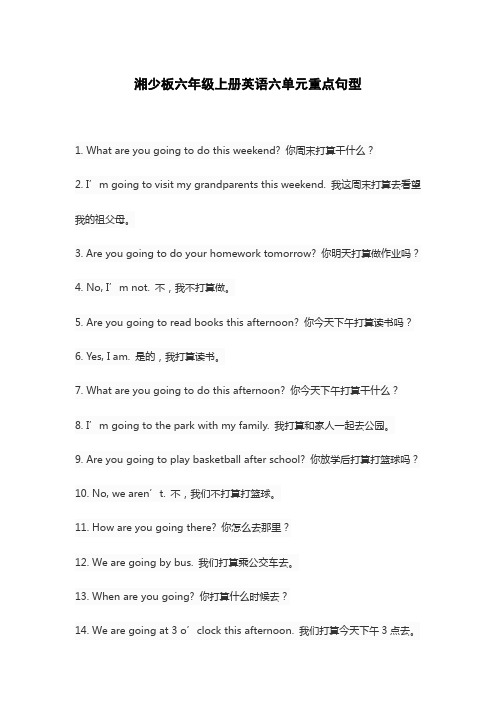
湘少板六年级上册英语六单元重点句型1. What are you going to do this weekend? 你周末打算干什么?2. I’m going to visit my grandparents this weekend. 我这周末打算去看望我的祖父母。
3. Are you going to do your homework tomorrow? 你明天打算做作业吗?4. No, I’m not. 不,我不打算做。
5. Are you going to read books this afternoon? 你今天下午打算读书吗?6. Yes, I am. 是的,我打算读书。
7. What are you going to do this afternoon? 你今天下午打算干什么?8. I’m going to the park with my family. 我打算和家人一起去公园。
9. Are you going to play basketball after school? 你放学后打算打篮球吗?10. No, we aren’t. 不,我们不打算打篮球。
11. How are you going there? 你怎么去那里?12. We are going by bus. 我们打算乘公交车去。
13. When are you going? 你打算什么时候去?14. We are going at 3 o’clock this afternoon. 我们打算今天下午3点去。
15. Are you going to watch TV this evening? 你今天晚上打算看电视吗?16. Yes, we are. 是的,我们打算看电视。
17. What are they going to do this weekend? 他们周末打算干什么?18. They are going to the cinema. 他们打算去看电影。
湘少版六年级上册英语语法完整版

湘少版六年级上册英语语法HEN system office room 【HEN16H-HENS2AHENS8Q8-HENH1688】背诵下面语法知识一、名词单数变复数的变化规则:1.一般情况直接加s2.以s,x, sh, ch结尾的加 es3.以o结尾的,表示“有生命”的事物加espotato-------potatoes 土豆 tomato------tomatoes 西红柿4.以o结尾的,表示“无生命”的事物加szoo------zoos 动物园 photo------photos 照片5.以辅音字母+y结尾的,先变y为i再加es;6..以f或fe结尾的名词,把f或fe变为v再加es.7.特殊变化的复数:man------men 男人 woman------women 女人child------children 孩子(们) mouse------mice 老鼠foot-------feet 脚 tooth------teeth 牙齿二、现在分词(动词ing)的变化规则1、一般情况下直接加ing,2、以一个不发音的e结尾的,先去e再加ing,take-----taking 拍(照), make-----making 制造,制作3、重读闭音节词,先双写最后一个字母再加ing,run------running 跑, swim------swimming, 游泳skip-----skipping 跳绳三、动词的第三人称单数的变化规则1、一般情况直接加s,2、以s, sh, ch, o 等字母结尾的加es,wash------washes 洗 go------goes 去3、以辅音字母加y结尾的,先把y改为i,再加es,4、特殊变化:have-----has 有,吃四、动词的过去式1.一般情况直接加ed,2.以不发音e结尾的只加d,3.以辅音字母加y结尾的,变y为i再加ed,4.重读闭音节词,先双写最后一个辅音字母,再加ed,5.特殊变化go---went is---was are---were have---hadtake---took eat---ate read---read cut---cutput---put do---did come---came feel----feltlearn---learnt speak---spoke teach---taught say---said run---ran swim---swam stand---stood sing--- sangwrite---wrote can---could see---saw bring---brought五、形容词比较级和最高级的变化规则1. 一般情况下在词尾加er或est;2. 以不发音字母e结尾的,只加r 或st;3. 重读闭音节词,先双写最后一个字母,再加er或est;4. 以辅音字母+y结尾的,先把y改为i,再加er 或est;5.多音节和部分双音节形容词,在这个词前加more表示比较级,在这个词前加most表示最高级。
新湘少版六年级(上册)英语复习资料全
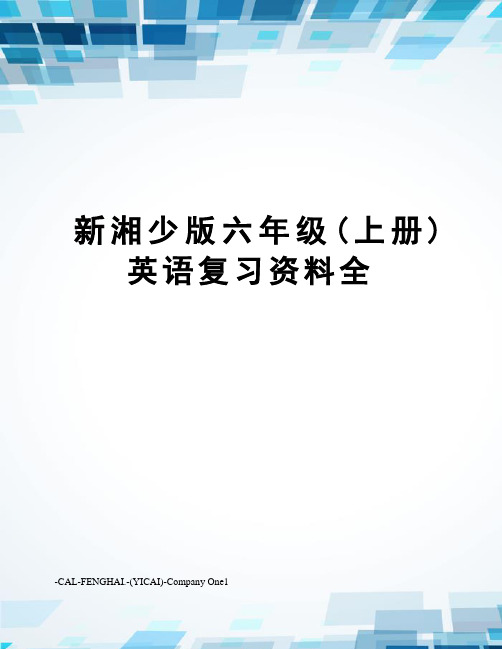
新湘少版六年级(上册)英语复习资料全-CAL-FENGHAI.-(YICAI)-Company One1新湘少版六年级上册英语复习资料Unit1 What did you do during the holidays假期你做什么了单词:learn words and sentences 学习单词和句子play games 玩游戏learn writing 学习写作practise listening 练习听力句型:what did you do during the holidays假期你做了什么I read many books.我看了许多书。
语法:动词过去式的变化规则一、规则动词的过去式变化规则①一般情况动词词尾直接加-ed。
如:work—worked play—played②以不发音的-e结尾的动词,动词词尾加-d。
如:live—lived taste—tasted③以辅音字母+y结尾的动词,把y变为i,再加-ed。
如:study—studied cry—cried④以一个辅音字母结尾的,重读闭音节动词(即Vivi常说的辅元辅结构)双写词尾辅音字母,再加-ed.如:stop—stopped clap—clapped二、不规则变化动词没有变化规律,需要童鞋们好好识记。
如:go—went make—madeget—got buy—boughtlearn—learnt do—didtake—took have—hadread—read speak—spoketeach—taught say—saidUnit2 Katie always gets up early凯蒂总是很早起床词汇:(频度副词:always总是、often常常、sometimes有时、never从不)get up 起床return home 回家take a walk 去散步do her homework 做她的家庭作业have breakfast/lunch/dinner吃早/ 中/ 晚餐play chess 下象棋wave goodbye 挥手再见read a newspaper 读报纸be late for school 上学迟到句型:Peter always gets up at 7:00 a.m。
湘少版六年级英语上册1-6单元资料

Phrases(短语):
①公共假期:public holiday ②上周:last week ③谈论:talk about ④水下世界:the Underwater World ⑤去野炊:go for a picnic ⑥科学故事:science stories ⑦去海滩:go to the beach ⑧购物中心:shopping center ⑨出去:go out ⑩待在家:stay at home
Phrases(短语)
• ⑨ feel lonely 感到孤独 ⑩ try to… 试着 ⑾ get together聚在一起 ⑿ eat mooncakes吃月饼 ⒀on this day 在这一天 ⒁come with me 跟我来 ⒂in the garden 在花园 ⒃Chinese tea 中国茶 ⒄look at the moon 赏月
• 二、不规则变化: feel-felt 感觉 ,run-ran跑 fly-flew 飞,sit-sat坐,put-put放 take-took 带、吃(药),sing-sang唱 buy-bought买,see-saw看见
Unit 5 The children are
playing noisily
Consolidation(巩固):
practice(part D,page3)
• 3.PartF:How is Peter going to the cinema?
• 1. Peter is going to the cinema by bike. • 2. Anne is going to the cinema on foot. • 3. Lingling is going to the cinema by
she)
全新湘少版六年级英语上册知识归纳(全册 7页)
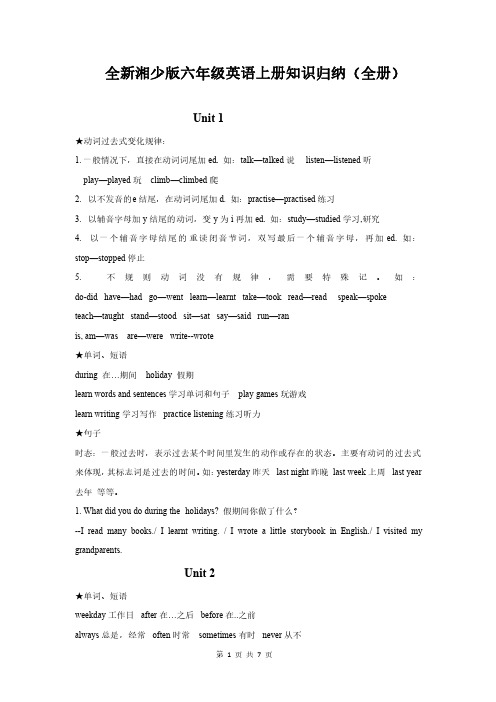
全新湘少版六年级英语上册知识归纳(全册)Unit1★动词过去式变化规律:1.一般情况下,直接在动词词尾加ed.如:talk—talked说listen—listened听play—played玩climb—climbed爬2.以不发音的e结尾,在动词词尾加d.如:practise—practised练习3.以辅音字母加y结尾的动词,变y为i再加ed.如:study—studied学习,研究4.以一个辅音字母结尾的重读闭音节词,双写最后一个辅音字母,再加ed.如:stop—stopped停止5.不规则动词没有规律,需要特殊记。
如:do-did have—had go—went learn—learnt take—took read—read speak—spoke teach—taught stand—stood sit—sat say—said run—ranis,am—was are—were write--wrote★单词、短语during在…期间holiday假期learn words and sentences学习单词和句子play games玩游戏learn writing学习写作practice listening练习听力★句子时态:一般过去时,表示过去某个时间里发生的动作或存在的状态。
主要有动词的过去式来体现,其标志词是过去的时间。
如:yesterday昨天last night昨晚last week上周last year 去年等等。
1.What did you do during the holidays?假期间你做了什么?--I read many books./I learnt writing./I wrote a little storybook in English./I visited my grandparents.Unit2★单词、短语weekday工作日after在…之后before在..之前always总是,经常often时常sometimes有时never从不wave goodbye挥手再见be late for school上学迟到read a newspaper读报纸play chess下棋take a walk散步get up起床have/has breakfast吃早餐return home回家★句子时态:一般现在时:表示经常,反复发生的动作或存在的状态。
湘少版英语六年级英语上册 Unit 7 知识清单
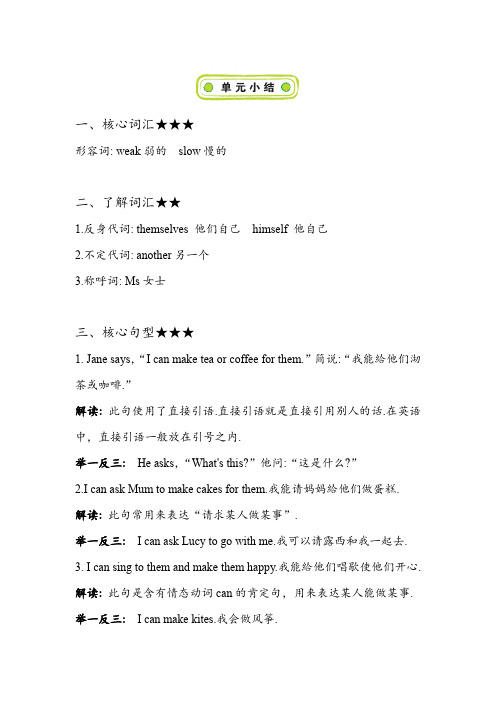
一、核心词汇★★★
形容词: weak弱的slow慢的
二、了解词汇★★
1.反身代词: themselves 他们自己himself 他自己
2.不定代词: another另一个
3.称呼词: Ms女士
三、核心句型★★★
1. Jane says,“I can make tea or coffee for them.”简说:“我能給他们沏茶或咖啡.”
解读: 此句使用了直接引语.直接引语就是直接引用别人的话.在英语中,直接引语一般放在引号之内.
举一反三: He asks,“What's this?”他问:“这是什么?”
2.I can ask Mum to make cakes for them.我能请妈妈給他们做蛋糕.
解读: 此句常用来表达“请求某人做某事”.
举一反三:I can ask Lucy to go with me.我可以请露西和我一起去. 3. I can sing to them and make them happy.我能給他们唱歇使他们开心.解读: 此句是含有情态动词can的肯定句,用来表达某人能做某事.举一反三: I can make kites.我会做风筝.
四、了解句型★★
I can help them to get on or off the bus. 我们帮助他们上公共汽车或下公共汽车.
解读: 此句常用来表达能帮助某人做某事.
举一反三: I can help you (to) wash the clothes.我能帮助你洗衣服.。
新湘少版六年级上册英语复习资料全

新湘少版六年级上册英语复习资料Unit1 What did you do during the holidays?假期你做什么了?单词:learn words and sentences 学习单词和句子playgames 玩游戏learn writing 学习写作practise listening 练习听力句型:what did you do during the holidays?假期你做了什么?I read many books。
我看了许多书。
语法:动词过去式的变化规则一、规则动词的过去式变化规则①一般情况动词词尾直接加—ed.如:work—worked play-played②以不发音的-e结尾的动词,动词词尾加-d。
如:live—lived taste-tasted③以辅音字母+y结尾的动词,把y变为i,再加—ed.如:study—studied cry-cried④以一个辅音字母结尾的,重读闭音节动词(即Vivi常说的辅元辅结构)双写词尾辅音字母,再加—ed.如:stop—stopped clap-clapped二、不规则变化动词没有变化规律,需要童鞋们好好识记。
如:go—went make—madeget—got buy—boughtlearn—learnt do—didtake-took have—hadread—read speak—spoketeach—taught say—saidUnit2 Katie always gets up early凯蒂总是很早起床词汇:(频度副词:always总是、often常常、sometimes有时、never从不)get up 起床return home 回家take a walk 去散步do her homework 做她的家庭作业have breakfast/lunch/dinner吃早/ 中/ 晚餐play chess 下象棋wave goodbye 挥手再见read a newspaper 读报纸be late for school 上学迟到句型:Peter always gets up at 7:00 a。
最新湘少版六年级英语上册重点句型汇总(全册)

最新湘少版六年级英语上册重点句型汇总(全册)最新湘少版六年级英语上册重点句型汇总Unit1 What did you do during the holidays?1. What did you do during the holidays? 你在假期期间做了什么?2. I learnt writing. 我学习了写作。
3. I read many books. 我读了许多书。
4. I practised listening. 我练习了听力。
5. I played games. 我玩了游戏。
Unit2 Katie always gets up early.1.Katie always gets up early. On weekdays, she always gets up at 6:30a.m.凯特总是起得很早,在平日,她总是早上六点半起床。
2.Katie often does her homework before dinner.凯特经常在晚饭前做她的家庭作业。
3.Katie sometimes plays chess with her father.凯特有时和她的爸爸下棋。
4.Katie never takes a walk. 凯特从不散步。
Unit3 I like my computer.1.Dad, thank you. I like my computer. 爸爸,谢谢你,我喜欢我的电脑。
2.It’s very fast. It will help you a lot. 它的运行速度很快,它将帮你很多。
3.We can email our friends on the computer.我们能在电脑上给朋友发送邮件。
4.We can play games on the computer. 我们能在电脑上玩游戏。
第1 页共1 页。
新湘少版六年级英语上册一到四单元知识点
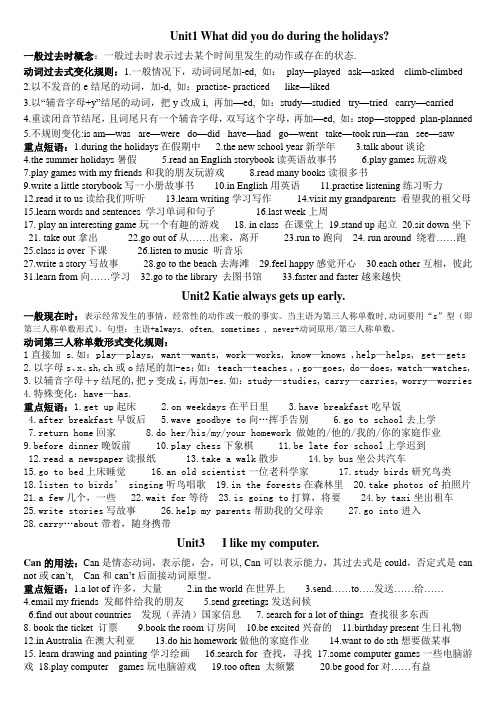
Unit1 What did you do during the holidays?一般过去时概念:一般过去时表示过去某个时间里发生的动作或存在的状态.动词过去式变化规则:1.一般情况下,动词词尾加-ed, 如:play—played ask—asked climb-climbed2.以不发音的e结尾的动词,加-d, 如:practise- practiced like—liked3.以“辅音字母+y”结尾的动词,把y改成i, 再加—ed, 如:study—studied try—tried carry—carried4.重读闭音节结尾,且词尾只有一个辅音字母,双写这个字母,再加—ed, 如:stop—stopped plan-planned5.不规则变化:is am—was are—were do—did have—had go—went take—took run—ran see—saw重点短语:1.during the holidays在假期中 2.the new school year新学年 3.talk about谈论4.the summer holidays暑假5.read an English storybook读英语故事书6.play games玩游戏7.play games with my friends和我的朋友玩游戏8.read many books读很多书9.write a little storybook写一小册故事书10.in English用英语11.practise listening练习听力12.read it to us读给我们听听13.learn writing学习写作14.visit my grandparents 看望我的祖父母15.learn words and sentences 学习单词和句子st week上周17. play an interesting game玩一个有趣的游戏18. in class 在课堂上19.stand up起立20.sit down坐下21. take out拿出22.go out of从……出来,离开23.run to跑向24. run around 绕着……跑25.class is over下课26.listen to music 听音乐27.write a story写故事28.go to the beach去海滩29.feel happy感觉开心30.each other互相,彼此31.learn from向……学习32.go to the library 去图书馆33.faster and faster越来越快Unit2 Katie always gets up early.一般现在时:表示经常发生的事情,经常性的动作或一般的事实。
- 1、下载文档前请自行甄别文档内容的完整性,平台不提供额外的编辑、内容补充、找答案等附加服务。
- 2、"仅部分预览"的文档,不可在线预览部分如存在完整性等问题,可反馈申请退款(可完整预览的文档不适用该条件!)。
- 3、如文档侵犯您的权益,请联系客服反馈,我们会尽快为您处理(人工客服工作时间:9:00-18:30)。
背诵下面语法知识
一、名词单数变复数的变化规则:
1.一般情况直接加s
2.以s,x, sh, ch结尾的加es
3.以o结尾的,表示“有生命”的事物加es
potato-------potatoes 土豆tomato------tomatoes 西红柿
4.以o结尾的,表示“无生命”的事物加s
zoo------zoos 动物园photo------photos 照片
5.以辅音字母+y结尾的,先变y为i再加es;
6..以f或fe结尾的名词,把f或fe变为v再加es.
7.特殊变化的复数:
man------men 男人woman------women 女人child------children 孩子(们)mouse------mice 老鼠foot-------feet 脚tooth------teeth 牙齿
二、现在分词(动词ing)的变化规则
1、一般情况下直接加ing,
2、以一个不发音的e结尾的,先去e再加ing,
take-----taking 拍(照), make-----making 制造,制作
3、重读闭音节词,先双写最后一个字母再加ing,
run------running 跑, swim------swimming, 游泳
skip-----skipping 跳绳
三、动词的第三人称单数的变化规则
1、一般情况直接加s,
2、以s, sh, ch, o 等字母结尾的加es,
wash------washes 洗go------goes 去
3、以辅音字母加y结尾的,先把y改为i,再加es,
4、特殊变化:have-----has 有,吃
四、动词的过去式
1.一般情况直接加ed,
2.以不发音e结尾的只加d,
3.以辅音字母加y结尾的,变y为i再加ed,
4.重读闭音节词,先双写最后一个辅音字母,再加ed,
5.特殊变化
go---went is---was are---were have---had
take---took eat---ate read---read cut---cut
put---put do---did come---came feel----felt
learn---learnt speak---spoke teach---taught say---said run---ran swim---swam stand---stood sing--- sang write---wrote can---could see---saw bring---brought
五、形容词比较级和最高级的变化规则
1. 一般情况下在词尾加er或est;
2. 以不发音字母e结尾的,只加r 或st;
3. 重读闭音节词,先双写最后一个字母,再加er或est;
4. 以辅音字母+y结尾的,先把y改为i,再加er 或est;
5.多音节和部分双音节形容词,在这个词前加more表示比较级,在这个词前加most表示最高级。
6.需双写的形容词比较级和最高级
big(大的)--bigger(更大的)--biggest(最大的)
fat(胖的)--fatter(更胖的)--fattest(最胖的)
thin(瘦的)--thinner(更瘦的)--thinnest(最瘦的
hot(热的)--hotter(更热的)--fattest(最热的)
7.特殊变化的形容词比较级和最高级
good(好的)--better(更好的)--best(最好的)
little(少的)--less(更少的)--least(最少的)
many\much(许多的)--more(更多的)--most(最多的)。
